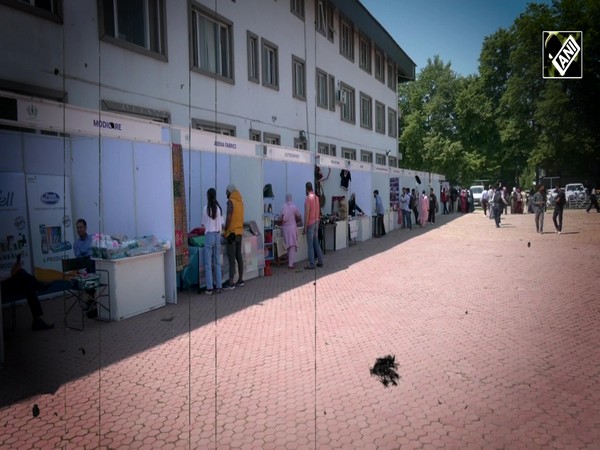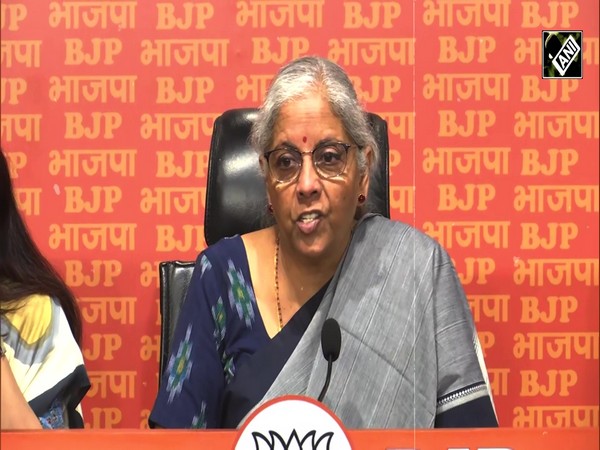Year Ender: Condition of Afghan women plunges to new low under Taliban
Dec 24, 2023

New Delhi [India], December 24 : Taliban rule has had a devastating impact on Afghan women and girls. Afghanistan has plunged into an extreme humanitarian crisis following the Taliban takeover of the region in August 2021.
The Taliban have imposed rights-violating policies that have created huge barriers to women's and girls' health and education, curtailed freedom of movement, expression, and association, and deprived many of earned income.
The Taliban have banned women and girls from secondary and higher education, and altered curricula to focus more on religious studies. They dictate what women must wear, how they should travel, workplace segregation by sex, and even what kind of cell phones women should have. They enforce these rules through intimidation and inspections.
The women said they had acute feelings of insecurity because the Taliban have dismantled the formal police force and the Women's Affairs Ministry, are extorting money and food from communities, and are targeting for intimidation women they see as enemies, such as those who worked for foreign organizations and the previous Afghan government. Most of them cited serious mental health consequences since the Taliban takeover, including fear, anxiety, hopelessness, insomnia, and a deep sense of loss and helplessness.
Almost two years ago, the Taliban took control of Afghanistan, and the International Monetary Fund (IMF) issued a report stating that the Gross Domestic Product (GDP) could see a 30 per cent contraction following the Taliban takeover.
Proving it to be true, Afghanistan did not just experience that; Afghan citizens suffered and are still suffering from continued human rights violations and economic and humanitarian crises.
Afghanistan, under Taliban rule, witnessed extrajudicial executions, lack of freedom of expression, restrictive and abusive decrees on women's and girls' rights, unlawful attacks and killings, and increases in internally displaced people, according to Amnesty International.
Additionally, the mass exodus of skilled professionals--doctors, engineers, lawyers, teachers, and government officials--left these sectors severely under-resourced, exacerbating the country's woes.
Moreover, taking away their rights to humanitarian rights, the de facto authorities have barred girls from attending secondary school, restricted women and girls' freedom of movement, excluded women from most areas of the workforce and banned women from using parks, gyms and public bath houses.
The UN Office for the Coordination of Humanitarian Affairs reported a staggering increase in poverty, with 97 per cent of Afghans living below the poverty line, a stark rise from 47 per cent in 2020, according to Amnesty International.
The Afghan ban on women's working and studying had an impact on many facets of women's lives in the nation and culminated with the confinement of Afghan women and girls to the four walls of their homes.
Later in December 2022, the Taliban made another announcement, banning Afghan women from attending university in the country as they had not been wearing appropriate Islamic attire at colleges and interacting with their male counterparts. This triggered nationwide protests in Kabul, Nangarhar, Takhar, and Herat, and the protestors were seen braving water cannons in biting cold conditions.
Following the protests, the Taliban authorities arrested five women taking part in a protest, along with three journalists. Notably, detaining protesters and journalists is not something new in Afghanistan, reported Khaama Press.
Additionally, the Taliban regime ordered all local and foreign non-governmental organisations (NGOs) to stop female employees from coming to work in the country and ordered them to suspend the jobs of female employees until further announcements, Afghan news agency TOLOnews reported.
However, these violations raised worldwide concerns. The European Union condemned the Taliban's ban on women working for NGOs and said that it was assessing the impact of its aid in Afghanistan, reported Al Jazeera.
The economy continued to be seriously hampered by the freezing of Afghan foreign reserves and the cutting of development assistance, steps taken by the international community following the Taliban takeover.
Meanwhile, the aid received by Afghanistan in 2022 was mostly humanitarian assistance, aimed at preventing starvation, but not contributing to other social needs. As a result, access to healthcare, employment and education continued to suffer.
In the past two years, international organisations including Amnesty International, the United Nations, and the European Union, have called upon the Taliban to remove the ban on women's education and their jobs and to not deprive them of their human rights.
Earlier in June, a United Nations expert said the Taliban's treatment of Afghanistan's women and girls may amount to gender apartheid, given how severely the de facto authorities of the country continue to violate their rights
UN Special Rapporteur on the situation of human rights in Afghanistan, Richard Bennett, told the Human Rights Council in Geneva: "Grave, systematic and institutionalised discrimination against women and girls is at the heart of Taliban ideology and rule, which also gives rise to concerns that they may be responsible for gender apartheid." The UN defines gender apartheid as "economic and social sexual discrimination against individuals because of their gender or sex."
As Afghan women continue to live miserable lives under Taliban rule, United Nations (UN) UN Women Executive Director Sima Bahous emphasised that women should be included in the future of Afghanistan.
Meanwhile, Amnesty International said that the voices of Afghan women and girls have been silenced and their dreams have been shattered, adding that removing them from public life is a "crime against humanity."
On the other hand, the United Nations Assistance Mission in Afghanistan (UNAMA) in one of its reports said that as a result of being deprived of education, girls have faced early and forced marriages.
Apart from the organisations, the humanitarian crisis in the country also sparked reactions from other countries, including India.
However, India has been standing up for the Afghan people, providing humanitarian aid, and calling out the human rights violations as well as the atrocities done to the women in Afghanistan.
Earlier this month, India's permanent representative to the United Nations, Ruchira Kamboj, reiterated the country's "unwavering commitment" to the Afghan people, emphasising the need for continued international attention and support for the country, which is already combating obstacles like terrorism and natural disasters.
Moreover, in the aftermath of the Taliban's resurgence in Afghanistan, India's significant contributions have been a beacon of hope for the nation and the broader region. While the world observed the shifting power dynamics with concern, India stood out as a steadfast partner, committed to Afghanistan's growth and stability for over two decades, as reported by Khaama Press.
India's commitment to Afghanistan has been unwavering, extending beyond infrastructure and development to encompass the hearts and minds of the Afghan people.
Prime Minister Narendra Modi, while addressing the summit of the Shanghai Cooperation Organisation (SCO) which was held in a virtual format in July, said that Afghan soil should not be allowed to be used to destabilise its neighbourhood. He further said that humanitarian assistance and setting up an elected government in Kabul are major priorities of the SCO.
In another move to extend help to the crisis-ridden country, External Affairs Minister S Jaishankar highlighted in June that India has sent back a technical team to its Embassy in Afghanistan and their job is essentially to monitor the situation and see how New Delhi can support the Afghan people.
In September, India delivered 50,000 MTs of wheat, 28 tonnes of disaster relief, and 200 tonnes of medicines, vaccines and other medical items to the country. India confirmed having sent these supplies to the neighbouring country in the Interactive Dialogue on the Office of the United Nations High Commissioner for Human Rights (OHCHR) Report on the human rights situation in Afghanistan at the 54th Session of the Human Rights Council.
Moreover, India has partnered with the United Nations Office on Drugs and Crime (UNODC) in its humanitarian efforts and has supplied 1100 units of female hygiene kits and blankets for UNODC female rehabilitation centres across Afghanistan.
Additionally, in March this year, India, in partnership with the United Nations World Food Programme sent 20,000 metric tonnes of wheat to Afghan people through the Chabahar Port to address the humanitarian crisis in the country.
The US has said that recognition of the Taliban depends on the behaviour of the Taliban leaders towards Afghan women, Khaama Press reported. Principal Deputy Spokesperson for the US Department of State, Vedant Patel, said that if Taliban authorities do not respect women's rights, they will not only make Afghanistan fall behind but also undermine the international legitimacy of this country.
Later in July, a spokesman for the Taliban Ministry of Vice and Virtue, Mohammad Akif Mahajar announced that the Taliban, under a new verbal decree, has banned women's beauty salons in Kabul and other provinces across the country.
Adding to the already existing decrees imposed on women, the Taliban in August banned women from visiting Band-e-Amir National Park in Afghanistan's central Bamyan province.
To help improve the ongoing crisis in the country, the World Food Programme (WFP) in September said that one billion dollars are required to avert a humanitarian disaster in Afghanistan, Khaama Press reported. The organisation also stated that it can provide food assistance to one in every ten Afghan citizens in need.
The United Nations Office for the Coordination of Humanitarian Affairs (OCHA) has warned in its most recent report about the decline and discontinuance of health services for those in need in Afghanistan due to budget constraints.
In October, the EU called for the immediate release of women detained in Afghanistan for defending their and others' rights and said arbitrary detentions undermine the caretaker government's domestic legitimacy.
The European Union's special representative for Afghanistan, Thomas Nicholson, said that arbitrary detentions of those defending their and others' rights are illegal and undermine the caretaker government's domestic legitimacy.
Recently, a survey conducted by the Afghanistan Women's Journalist Association (AWJA) uncovered significant challenges faced by female journalists in the country, Khaama Press reported.
It further indicated that female journalists encounter obstacles such as job insecurity, financial constraints, and limited access to information, impeding their effective work.
Last week, Afghanistan completed one year of the ban on girls' education. Once again, women in Afghanistan started demanding that the Taliban regime reopen universities.
Throughout this year, girls and women have never remained silent against the ban on education and have continued raising their voices, either through protests or by calling out the Taliban authorities.
However, the inflexibility of the Taliban towards women's freedoms and the lack of practical action by the international community have increased disappointment.


















